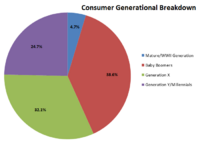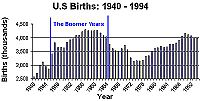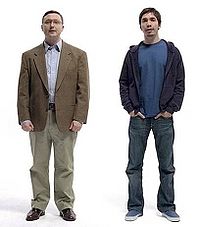Generational Gaps In Librarianship
From booktorrent

"AT THE AMERICAN Library Association (ALA) meeting in Toronto, a telling generational shift was apparent--under the table. The elegant Traditionalist librarian introducing the speakers wore a skirt, heels, and pantyhose. The Baby Boomer speaker wore a pantsuit, sandals, and no stockings. The Generation X librarian who participated in the panel discussion wore a short skirt and (horrors) flip-flops! Kaboom--a generational collision at its finest." [4]
Contents |
Traditionalists
Age Range
Born before ~1946
Characteristics
American Traditionalists lived through extreme economic and political turmoil. This generational history accounts for certain common tendencies. Traditionalists tend to be fiscally responsible and loyal to their places of work. They show very little interest in expanding the places they work and prefer to have a stable job with a single employer. Their practice of workplace communication tends to be formal; they tend to think that constant in-the-moment feedback and communication is unnecessary. Due to their seniority and perception of workplace communication, Traditionalists tend to react poorly to direct dialogs concerning changes in the workplace.
- Keys aspects to be understood by other generations
Traditionalists like to be respected for their experience and want to contribute as a mentors.
Position in Library
Traditionalist Librarians have been on the scene for a while. Even if one made a mid-life shift into Librarianship, one's time in the field would still be quite extensive. This often puts a Traditionalist in a managerial position. On the occasion that one does not work as a director or supervisor, one still has seniority, thus a Traditionalist passively or actively functions as a mentor.
Perception of Technology
The majority of Traditionalists are lagging in transitioning to digital organization. Most of their cataloging experience was built through card catalogs and other, now archaic, devices. The Traditionalist's career has been largely dominated by practices that have been radically changed by technology in the past 15 years, so sometimes they are resistant to training or change. For example, "One university librarian said her Traditionalist employees regularly engage in work-arounds--rather than embrace new technologies that are put in place they simply bypass new systems and continue doing things the way they've always been done. For example, in her library, the Traditionalists were still maintaining a paper list of periodicals. That wouldn't have been so bad, except that to get the paper list, someone had to print it off the computer. For better or for worse, technology will keep changing. Traditionalists who care about libraries will put aside their fears and dive into the training they need to stay current." The Click and Clash of Generations

Baby Boomers
Age Range
Born ~1946 through 1964[5].
Characteristics
Baby Boomers are the generation that was told by their Traditionalist parents that they "could do anything, from being an astronaut to becoming President[6]." As such, they are hard workers who go after what jobs they want, and that while they may choose to specialize in one career for several decades, they might also choose to switch occupations and pursue two or three careers in one lifetime before retirement. In a sense, they want to be an astronaut and President.
Position in Library
Baby Boomers of age group of 40 to 55-plus hold most of the librarian positions today. By sheer numbers, they have the most control and influence in how libraries are maintained and used. Consequently, when Boomers retire all around the same time, there will be a swath of new openings and the hope is that competent and dedicated Generation X-ers will fill those spots. In the meantime, Boomer librarians may opt for more flexible hours so that they can contribute to the library while managing a life outside of that scope[7].
As Library Patrons
As patrons of the public library in particular, the baby boomer generation is pushing for rethinking on how and what senior services are offered as community resources by libraries.
Today’s sometimes dated library service paradigm for “seniors” neither targets baby boomers, nor seeks their experience, wisdom, and contributions. By re-envisioning their services to better serve active, older adults, public libraries can become cornerstone institutions for baby boomers and productive aging. Public libraries are, after all, committed to lifelong engagement and learning[8].
As such, libraries' targeted resources for seniors will have to change continually in order to be useful. The Boomers are characterized by their push for mobility and independence well into traditional accepted old age. This is a change made possible partly by modern medicine making extended lives more livable. Boomers want community spaces to be useful and welcoming, they want resources and programs that keep them on top of the waves of new technology and culture. They are still the largest chunk of consumers in America and so drive the economy.
Perception of Technology
Baby boomers grew up with the prototypes that led to modern technology — "they were in their teens to early 30s when the first Apple computers and IBM PCs appeared.[9]" As such, they use and continue to pick up new devices. Their technological purchases drive what products sell and do not. Some interface preferences include that technology products are not "cluttered with 'excessive features.'" Something as basic as more intuitive useability will continue to shape how technology is tailored to the market that uses it, perhaps producing more organic and simplified gagetry, while increasing power and efficacy.

Generation X
Age Range
Born ~1965 through 1981[10].
Characteristics
Considered "highly independent, entrepreneurial, and comfortable with change,[11]" Generation Xers, known particularly for their independence, have a strong sense of self-preservation. They do not expect employers to keep them for their entire lives, and so are prepared to change job paths as necessary.
Position in Library
Generation X librarians are relatively few in number, especially in comparison to the mass of Baby Boomer librarians. They seek librarianship jobs with "varied career path" opportunities,[12] and are more likely to leave a librarianship position for another career path entirely. Generation X librarians are less likely to stick with librarianship long enough to gain seniority on a level comparable to many current Baby Boomer librarians. This is problematic, as many Boomers are retiring and taking their years of expertise with them, and Gen Xers are not staying long enough to fill those open roles adequately.
As Library Patrons
This generation saw the demise of the card catalog and the subsequent rise of the digital computer catalog. Gen Xers saw Choose Your Own Adventure novels, Animorphs, and Goosebumps come out as large series, and they are now prominent sections within many modern children's literature collections.
Perception of Technology
Gen Xers interacted with computers before and after Internet became feasible. Floppy disks the size of your face, small CRT monitors and clinky keyboards. The advent of pagers (Ha!) and then brick-sized mobile phones and eventually smaller floppies. The technology is in the hardware components.

Generation Y/Millennials
Age Range
Born ~1982 to the present. New generation delineations are cropping up.
Characteristics
Millennials are the generation that started to accept and celebrate geekdom, morphing it into popular culture, instead of an esoteric and ostracized status. Digital technologies are important, and the concept of not being able to contact someone else immediately is distressing or nearly unheard of (in first-world, technology-driven countries). Notably, Millennials are more likely to engage in group activities, and act as a group with pooled resources, than the more independent Generation Xer's. Gen Yers are also considered more ethnically diverse, with many having at least one immigrant parent[13].
Position in Library
At this point, as interns or volunteers, mostly. A wildly dedicated minority is just entering librarianship, and it will be a while before they earn a respected place at the table of seniority, with the oldest being about 29 years old.
As Library Patrons
Harry Potter mania ensues! Then a widening divide between those who buy the newest volume in order to beat everyone else to the punch and those who need to wait on the list of succession for one of the few available library copies; early buyers dominate by the end of the series. Same for Twilight I guess? Claims that Millenials don't read as their predecessors did (...are kind of entirely true).
Perception of Technology
Millennials see that "technology is assumed to be a natural part of the environment," so much so that many feel that their schools do not employ enough technology for their basic education needs[14]. Technology is an expected component of work and leisure activities (think about computers and their uses for Internet research as well as for games and socializing). They claim to use the Internet an average of 11 hours per week, (though I would speculate that there is a number of Internet users with hours upwards of 20 or 25 per week, judging by personal usage at times)[net.educause.edu/ir/library/pdf/erm0342.pdf]. They saw the end of the floppy disk, the beginnings of CD-ROMs and DVDs, now MP3s and "cloud technology." The technology is accessed through the computer terminal, but lies in in the Internet. The gadget is a portal...
References
- The Click and Clash of Generations
- California Boomer Initiative - 2007
- NYT Blogs: What Do Baby Boomers Want from Technology?
- Boomers, Gen Xers, & Millenials: Understanding the New Students
